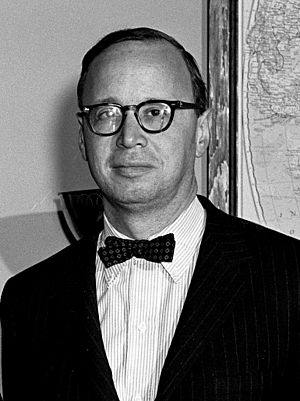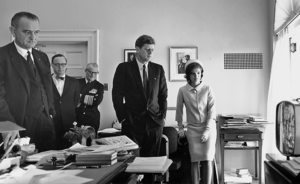Arthur M. Schlesinger Jr. facts for kids
Quick facts for kids
Arthur M. Schlesinger Jr.
|
|
|---|---|

Schlesinger in 1961
|
|
| Born | Arthur Bancroft Schlesinger October 15, 1917 Columbus, Ohio, U.S. |
| Died | February 28, 2007 (aged 89) New York City, U.S. |
| Occupation | Historian, writer |
| Alma mater | Harvard University (AB) Peterhouse, Cambridge |
| Period | 1939–2007 |
| Subject | Politics, social issues, history |
| Literary movement | American liberal theory |
| Notable awards | Pulitzer Prize (1946, 1966) National Humanities Medal (1998) |
| Spouse |
Alexandra Emmet Allan
(m. 1971) |
| Children | 5 |
Arthur Meier Schlesinger Jr. (born Arthur Bancroft Schlesinger; October 15, 1917 – February 28, 2007) was an American historian and writer. He was known for his work on 20th-century American history, especially about leaders like Franklin D. Roosevelt, John F. Kennedy, and Robert F. Kennedy.
Schlesinger was a key speechwriter and advisor for Adlai Stevenson II during the 1952 and 1956 presidential elections. He also served as a special assistant to President John F. Kennedy from 1961 to 1963. His book, A Thousand Days: John F. Kennedy in the White House, won the 1966 Pulitzer Prize for Biography or Autobiography. He also won a Pulitzer Prize in 1946 for his book The Age of Jackson.
Contents
Early Life and Education
Arthur M. Schlesinger Jr. was born in Columbus, Ohio. His father, Arthur M. Schlesinger Sr., was also a famous historian.
Arthur Jr. went to Phillips Exeter Academy and then to Harvard University, where he graduated with top honors in 1938. He then studied at Peterhouse, Cambridge in England.
During World War II, Schlesinger worked for the U.S. government. He was part of the Office of War Information and later the Office of Strategic Services (OSS), which was an early version of the CIA. While working for the OSS, he finished his first Pulitzer Prize-winning book, The Age of Jackson. After the war, he became a history professor at Harvard.
Political Involvement Before 1960
In 1947, Schlesinger helped start a group called Americans for Democratic Action. This group supported liberal ideas in American politics. He was the national chairman of this group from 1953 to 1954.
Schlesinger became a main speechwriter for Adlai Stevenson II, who ran for president in 1952 and 1956. He also supported John F. Kennedy (JFK) when Kennedy ran for vice president in 1956.
Schlesinger knew John F. Kennedy from their time at Harvard. When Kennedy ran for president in 1960, Schlesinger supported him. He helped with speeches and wrote a book comparing Kennedy to his opponent, Richard Nixon.
Working with President Kennedy
After John F. Kennedy won the election, he asked Schlesinger to join his team. In 1961, Schlesinger became a Special Assistant to the President. He mainly worked on issues related to Latin America and helped write speeches for President Kennedy.

Schlesinger was told about the secret plan for the Bay of Pigs Invasion in Cuba. He wrote a memo to the president saying that the plan would harm America's image around the world. Even though he had doubts, he didn't speak up strongly enough during the meetings. After the invasion failed, he regretted not speaking more forcefully.
During the Cuban Missile Crisis in 1962, Schlesinger helped Adlai Stevenson, the U.S. Ambassador to the United Nations, prepare his presentation about the crisis to the United Nations Security Council.
After President Kennedy was assassinated in November 1963, Schlesinger left his White House job. He then wrote A Thousand Days: John F. Kennedy in the White House, which won him his second Pulitzer Prize.
Later Career and Politics
In 1966, Schlesinger returned to teaching at the CUNY Graduate Center. Even after he retired from teaching in 1994, he stayed involved with the university.
He remained loyal to the Kennedy family throughout his life. He campaigned for Robert F. Kennedy's presidential run in 1968, which sadly ended with Kennedy's assassination. Schlesinger later wrote a biography about him called Robert Kennedy and His Times.
Schlesinger was also a strong critic of President Richard Nixon. He even ended up on Nixon's list of political opponents. Later, Nixon became his next-door neighbor!
He continued to share his political views through his books and speeches. He was against the 2003 invasion of Iraq and believed the media didn't do enough to present arguments against the war.
Family Life
Arthur M. Schlesinger Jr. had five children. Four were from his first marriage to Marian Cannon Schlesinger, and one son was from his second marriage to Alexandra Emmet. His children include:
- Stephen Schlesinger, a writer on foreign affairs.
- Katharine Kinderman, a writer and producer.
- Christina Schlesinger, an artist.
- Andrew Schlesinger, a writer and editor.
- Robert Schlesinger, a writer and editor.
Schlesinger had many friends from politics, arts, and writing. His friends included presidents, actors, and other famous people.
Career Highlights
Education and Academic Life
- 1933: Graduated from Phillips Exeter Academy
- 1938: Earned his A.B. degree with highest honors from Harvard University
- 1938–1939: Studied at Peterhouse, Cambridge
- 1939–1942: Member of the Society of Fellows at Harvard University
- 1946–1962: Professor of History at Harvard University
- 1966–1994: Albert Schweitzer Professor of Humanities at the CUNY Graduate Center
Government Service
- 1942–1943: Worked for the Office of War Information
- 1943–1945: Served as an intelligence analyst in the Office of Strategic Services
- 1961–1964: Special Assistant to President John F. Kennedy
Political Campaigns
- Helped found Americans for Democratic Action
- Speechwriter for Adlai Stevenson II in 1952 and 1956
- Speechwriter for John F. Kennedy in 1960
- Speechwriter for Robert F. Kennedy in 1968
- Speechwriter for George McGovern in 1972
- Active in Ted Kennedy's presidential campaign in 1980
Death
Arthur M. Schlesinger Jr. passed away on February 28, 2007, at the age of 89, after having a heart attack in Manhattan. He is buried in Mount Auburn Cemetery in Cambridge, Massachusetts.
Important Books
- The Age of Jackson (1945): This book won him a Pulitzer Prize for History. It explored the ideas of Jacksonian democracy.
- The Vital Center (1949): In this book, he supported the New Deal policies of Franklin D. Roosevelt.
- A Thousand Days: John F. Kennedy in the White House (1965): This book won him his second Pulitzer Prize. It tells the story of the Kennedy administration.
- The Imperial Presidency (1973): In this book, he wrote about how the power of the U.S. presidency had grown.
- Robert Kennedy and His Times (1978): A popular biography about Robert F. Kennedy.
- The Disuniting of America (1991): In this book, he discussed his concerns about multiculturalism.
- Journals 1952–2000 (published after his death in 2007): A collection of his personal diaries.
Awards and Honors
- 1946: Pulitzer Prize for History for The Age of Jackson
- 1955: Elected to the American Academy of Arts and Sciences
- 1958: Bancroft Prize for The Crisis of the Old Order
- 1966: National Book Award for A Thousand Days
- 1966: Pulitzer Prize for Biography or Autobiography for A Thousand Days
- 1979: National Book Award for Robert Kennedy and His Times
- 1998: National Humanities Medal
- 2003: Four Freedoms Award
Images for kids
See also
 In Spanish: Arthur M. Schlesinger Jr. para niños
In Spanish: Arthur M. Schlesinger Jr. para niños
 | Kyle Baker |
 | Joseph Yoakum |
 | Laura Wheeler Waring |
 | Henry Ossawa Tanner |

